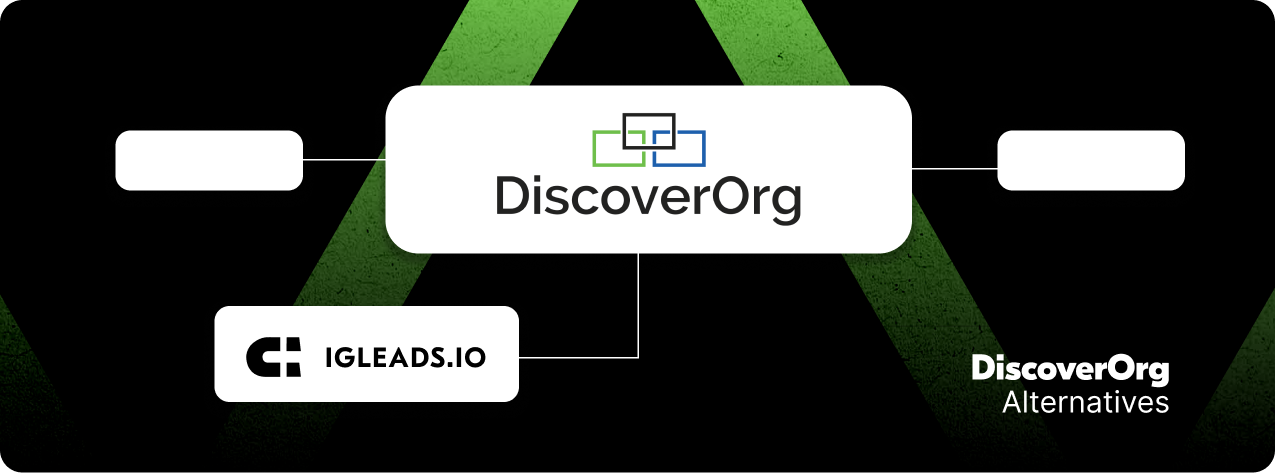How to Buy Email Lists in 2025 (Complete Guide)

While marketers chase fleeting TikTok algorithms and Instagram’s latest feature changes, savvy businesses are quietly doubling their revenue using the oldest digital channel in existence. With average ROIs exceeding 36:1, the data is clear – but the rules have completely transformed this year. This guide reveals exactly how to leverage purchased email lists in today’s AI-powered ecosystem without wasting budget or damaging your sender reputation.
Did you know that IGLeads offers an email scraper tool that delivers thousands of emails in a few hours? It is one of the easiest ways to expand your email list with high-quality leads.
Why Email Lists Matter More Than Ever in 2025
In the chaos of building a business, whether you’re a scrappy solo founder or racing to scale, there’s one asset that quietly outperforms almost everything else: your email list.
Let’s be honest. It’s 2025, and we’ve all heard countless predictions about email’s demise. Yet here we are, watching email marketing consistently deliver the highest ROI of any digital channel. Why? Because while social platforms change algorithms overnight and ad costs climb relentlessly skyward, your email list remains entirely yours, giving you a direct line to people who’ve actually asked to hear from you.
Think about it: no middleman, no unpredictable reach, no rental fees, just you and your audience, having a conversation on your terms.
But there’s a catch. Not just any list will do. That outdated spreadsheet of contacts or those questionable purchased leads? They’re more of a liability than an asset. A truly valuable email list, one that drives real business growth, requires intention, nurturing, and the right approach.
In this guide, I’ll walk you through everything that works: building your list from scratch (yes, even if you’re starting at zero), automating growth with smart tools, navigating the minefield of purchased lists, and transforming casual subscribers into your most valuable customers.
Let’s turn your email list into the business engine it was meant to be.
What This Guide Will Cover
- How to build an email list manually
- How to build an email list using lead generation tools
- Buying email lists: when and how to do it
- Managing your email list for best results
- Tools comparison to help you choose the right solution
What is an Email List?
An email list is simply a collection of email addresses from people interested in your business, products, or content. These contacts have given you permission to reach out directly through newsletters, promotions, or personalized messages.
Don’t confuse an email list with email marketing platforms. Tools like Mailchimp or ActiveCampaign help you send and manage communications, but your email list is a valuable data asset that you actually own and control.
Importance of Email List Management
Building a list is just the beginning. Managing it effectively determines your success. Good list management practices ensure high deliverability rates, strong engagement, and better segmentation for personalized marketing.
Without proper management, your list can quickly become stale, leading to high bounce rates, unsubscribes, and potential blacklisting by email providers.
Where Email Lists Fit into the Broader Marketing Funnel
- Top of the Funnel (TOFU): Attract new subscribers with lead magnets and content.
- Middle of the Funnel (MOFU): Nurture leads with valuable content and education.
- Bottom of the Funnel (BOFU): Convert leads into customers through targeted offers and promotions.
How to Build an Email List Manually
Manual list building involves collecting emails through direct interaction, both online and offline. This approach gives you complete control over who enters your list and typically creates a high-quality, high-intent audience of people who genuinely want to hear from you.
Tactics
Newsletter Signups with Lead Magnets
Offer something valuable in exchange for an email. Lead magnets can include ebooks, discount codes, mini-courses, or early access to product launches. This method works best when aligned with your core offer or audience interest.
Website Forms
Install email capture forms across your site. Use them on your homepage, in blog posts, or as exit-intent popups. Make it clear what users are signing up for and why it’s worth their time.
Manual LinkedIn or Email Outreach
Reach out directly to prospects via LinkedIn or cold email. If done with personalization and value, this can lead to meaningful connections and organic list growth.
Tools to Support Manual Capture
- Typeform: For building interactive lead capture forms.
- Notion: To organize and track leads in a flexible workspace.
- Google Sheets: A simple way to log and manage contacts.
- Zapier: Automate sending new contacts from forms to your CRM or email platform.
Pros and Cons
Pros:
- High intent: Everyone on your list opted in for a reason.
- Personalized: Allows one-to-one connection before the opt-in.
- Cost-effective: No need to purchase tools or data.
Cons:
- Time-consuming: Manual outreach or data entry slows growth.
- Not scalable: You’ll quickly hit a ceiling without automation.
- Inconsistent: Depends heavily on your time and effort.
Who This Works Best For
Manual methods are best for solopreneurs, early-stage startups, and anyone testing a new idea or market. It’s a strong starting point for building a loyal base of subscribers before moving to scalable systems.
How to Build an Email List with Tools

If you’re serious about growth, manual collection won’t be enough. Lead generation tools give you the ability to collect emails at scale, with precision targeting and automation built in.
Best Tools to Generate Email Leads
| Tool | Key Features | Best For | Est. Monthly Price |
| IGLeads.io | Scrapes data from Instagram, LinkedIn, Google Maps. No-code interface. Compliance-focused. | B2B, local services, real estate | $59–$149 |
| Apollo.io | B2B database, verified contacts, sales sequences | Sales teams, SDRs | $39–$99 |
| Clay.run | Lead enrichment with AI, visual workflow builder | Agencies, automation-heavy teams | $149+ |
| Hunter.io | Email lookup by domain, bulk search capabilities | B2B outreach | $49+ |
| PhantomBuster | Automates social media data scraping and outreach | Growth marketers | $59–$139 |
| Octoparse | Custom web scraping with visual drag-and-drop | Technical users, custom data | $75+ |
Use Cases
B2B SaaS Companies
Use Apollo to build a list of verified decision-makers in your industry. Export contacts, segment by role, and plug into a cold email sequence.
Local Service Providers
IGLeads.io can scrape businesses from Google Maps by keyword and location. You’ll get emails, websites, and social links—perfect for outreach.
Retail and DTC Brands
Use IGLeads.io to scrape niche Instagram influencers or TikTok creators for partnerships, affiliate deals, or customer targeting.
Agencies and Growth Teams
Tools like Clay and Octoparse allow you to create enriched datasets that combine web scraping with AI for segmentation, scoring, or automation.
Feature Comparison + Pricing Breakdown
| Feature | Manual Build | IGLeads.io | Apollo | Clay | Hunter.io | PhantomBuster | Octoparse |
|---|---|---|---|---|---|---|---|
| Automation | No | Yes | Yes | Yes | Partial | Yes | Yes |
| Platform Coverage | Limited | Multi | B2B | Multi | B2B | Social Media | Any site |
| Compliance Handling | User-based | Yes | Yes | Yes | No | No | User-based |
| Lead Enrichment | No | No | Yes | Yes | No | No | Yes |
| Setup Complexity | Low | Low | Medium | High | Low | Medium | High |
| Monthly Cost Range | Free | $59–$149 | $39–$99 | $149+ | $49+ | $59–$139 | $75+ |
Benefits of Using Tools
Speed
Tools like IGLeads or Apollo allow you to gather hundreds or thousands of leads in minutes. What would take a week manually can be done before lunch.
Precision Targeting
Filter by niche, location, job title, company size, social followers, and more. This ensures your outreach is tailored and efficient.
Scalability
Once your criteria are set, tools can run continuously, generating leads on autopilot while your team focuses on closing deals.
Workflow Integration
Most tools export to CSV, integrate with CRMs like HubSpot or Salesforce, and work with platforms like Mailchimp or Brevo for email marketing.
As you saw above, signing up for IGLeads is a good idea because it is one of the most reliable scraping tools on the market at an affordable price.
Buying Email Lists — What You Need to Know

Let’s be real about purchased email lists. Most marketers chase quick wins and end up with garbage data, blocked emails, or legal problems.
But under the right conditions? A strategically acquired list can be a valuable pipeline supplement if you know exactly what you’re doing.
Let’s separate the myths from reality and explore when this controversial tactic might work. And when it’s truly as dangerous as everyone claims.
When It’s Smart to Buy Email Lists
- Entering a New Market: You have no audience in a new vertical and need to make initial contact fast.
- Sales-Heavy Organizations: Your team has the bandwidth to qualify and work cold leads.
- Multi-Channel Campaigns: You combine cold outreach with advertising, retargeting, or content funnels.
Buying should never be your only strategy. But when used responsibly, it can jumpstart outreach in the right hands.
Legal Considerations
- Opt-In Status: You are legally responsible for ensuring the emails were collected with permission. Look for double opt-in or documented consent wherever possible.
- Compliance: Always follow regulations like GDPR (EU), CAN-SPAM (US), and CASL (Canada). Fines for violations can be steep.
- Data Source Transparency: Legitimate sellers will tell you exactly how the data was collected.
Never use a list if the provider refuses to clarify data origin, segmentation, or opt-in verification.
Where to Buy Legitimate Email Lists
- Industry-Specific Data Brokers: These firms specialize in collecting B2B leads in verticals like healthcare, finance, or retail.
- Verified B2B Platforms: Some services offer “opt-in guaranteed” lists, though you’ll often pay a premium.
- Niche Directories: Associations, chambers of commerce, or curated membership platforms often have segmented lists.
Always ask for a sample, recent data, and a compliance statement before buying.
High-Value List Segments
- Buy Email List by Industry: Highly focused lists segmented by vertical (e.g., dental practices, law firms, SaaS companies).
- USA Business Email List: Location-filtered lists for domestic outreach with better deliverability rates.
- Retail Email Lists: Direct-to-consumer brands, boutiques, and ecommerce operators segmented by product category or region.
How to Validate a Purchased List
Before sending anything, verify your list:
- Email Verification Tools: Use platforms like NeverBounce, ZeroBounce, or BriteVerify to clean out invalid or risky emails.
- Send a Test Campaign: Run a soft intro campaign with a small segment to test open rates and bounce rates.
- Monitor Deliverability: Watch spam complaints, unsubscribes, and engagement signals closely. Poor performance is a sign that the list is stale or irrelevant.
Building vs. Buying Email Lists — What’s Best?
Here’s how the three methods compare side by side:
| Feature/Need | Manual Build | Lead Tools | Purchased Lists |
| Time to Get Leads | Slow | Fast | Instant |
| Control & Accuracy | High | High | Medium |
| Legal Safety | High | High | Riskier |
| Cost | Low | Medium | Medium–High |
| Best For | Startups | Sales Teams | Agencies at scale |
What This Tells You
- Manual building is ideal for new businesses or niche brands that value deep relationships and quality.
- Lead tools like IGLeads.io and Apollo offer the best balance of speed, compliance, and control, especially if your team has limited time but high output goals.
- Purchased lists are high-risk but useful for advanced teams who can quickly filter, test, and warm up data without hurting sender reputation.
Use building methods as your foundation. Add buying only when you can manage it properly.
Email List Management Tips
List management is critical to long-term success. A messy, outdated, or poorly segmented list can tank your deliverability, frustrate your audience, and damage your domain reputation.
Here are the essentials:
1. Clean Your List Regularly
- Run verification tools every 30–60 days to remove hard bounces and fake emails.
- Remove unengaged subscribers after 3–6 months of inactivity.
- Keep bounce rate below 2% to avoid getting flagged by email service providers.
2. Segment by Interests, Activity, or Source
- Separate new subscribers from returning users.
- Segment by behavior (e.g., opened last 3 emails, clicked a product link).
- Identify subscribers by original acquisition channel (lead magnet, ad, scraped data, etc.).
This makes your emails more relevant and improves engagement.
3. Sync with Email Platforms
Make sure your list is always up-to-date with your email platform of choice:
- Mailchimp
- ActiveCampaign
- Brevo
- Or any CRM with email automation like HubSpot or Zoho
Automate syncing via Zapier, native integrations, or API if possible.
4. Avoid These Common Mistakes
- Overlapping segments: Avoid double-sending the same promo to the same contact from different flows
- No segmentation: Sending the same message to everyone drops open rates and increases unsubscribes.
- Stale lists: Lists that haven’t been emailed in 6+ months often perform worse than starting from scratch.
Any Questions?
Yes, but it depends on your region and how the list was collected. Always confirm the data is opt-in and compliant with GDPR/CAN-SPAM.
Tools like IGLeads, Clay, and Apollo are top-rated for their targeting precision and speed.
Ask for a sample, check data freshness, and avoid lists that don’t include opt-in proof or bounce rates.
Absolutely. Despite social media growth, email remains one of the most profitable marketing channels with the highest ROI.
Most platforms require explicit opt-in. Use caution—many reject purchased lists unless they meet compliance standards.


